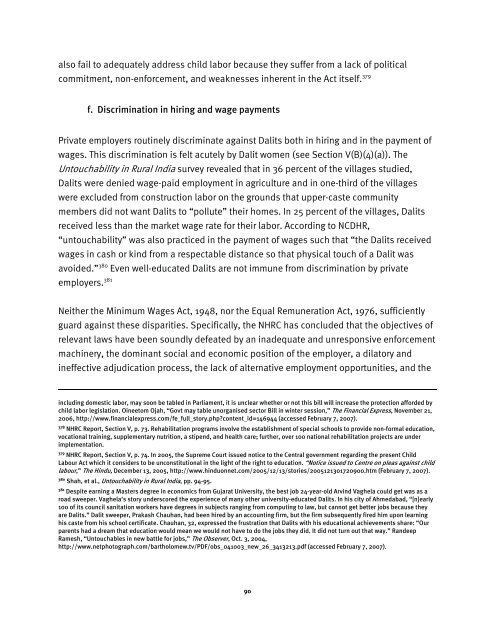Caste Discrimination against India's âUntouchablesâ - Human Rights ...
Caste Discrimination against India's âUntouchablesâ - Human Rights ...
Caste Discrimination against India's âUntouchablesâ - Human Rights ...
You also want an ePaper? Increase the reach of your titles
YUMPU automatically turns print PDFs into web optimized ePapers that Google loves.
also fail to adequately address child labor because they suffer from a lack of political<br />
commitment, non-enforcement, and weaknesses inherent in the Act itself. 379<br />
f. <strong>Discrimination</strong> in hiring and wage payments<br />
Private employers routinely discriminate <strong>against</strong> Dalits both in hiring and in the payment of<br />
wages. This discrimination is felt acutely by Dalit women (see Section V(B)(4)(a)). The<br />
Untouchability in Rural India survey revealed that in 36 percent of the villages studied,<br />
Dalits were denied wage-paid employment in agriculture and in one-third of the villages<br />
were excluded from construction labor on the grounds that upper-caste community<br />
members did not want Dalits to “pollute” their homes. In 25 percent of the villages, Dalits<br />
received less than the market wage rate for their labor. According to NCDHR,<br />
“untouchability” was also practiced in the payment of wages such that “the Dalits received<br />
wages in cash or kind from a respectable distance so that physical touch of a Dalit was<br />
avoided.” 380 Even well-educated Dalits are not immune from discrimination by private<br />
employers. 381<br />
Neither the Minimum Wages Act, 1948, nor the Equal Remuneration Act, 1976, sufficiently<br />
guard <strong>against</strong> these disparities. Specifically, the NHRC has concluded that the objectives of<br />
relevant laws have been soundly defeated by an inadequate and unresponsive enforcement<br />
machinery, the dominant social and economic position of the employer, a dilatory and<br />
ineffective adjudication process, the lack of alternative employment opportunities, and the<br />
including domestic labor, may soon be tabled in Parliament, it is unclear whether or not this bill will increase the protection afforded by<br />
child labor legislation. Oineetom Ojah, “Govt may table unorganised sector Bill in winter session,” The Financial Express, November 21,<br />
2006, http://www.financialexpress.com/fe_full_story.php?content_id=146944 (accessed February 7, 2007).<br />
378<br />
NHRC Report, Section V, p. 73. Rehabilitation programs involve the establishment of special schools to provide non-formal education,<br />
vocational training, supplementary nutrition, a stipend, and health care; further, over 100 national rehabilitation projects are under<br />
implementation.<br />
379<br />
NHRC Report, Section V, p. 74. In 2005, the Supreme Court issued notice to the Central government regarding the present Child<br />
Labour Act which it considers to be unconstitutional in the light of the right to education. “Notice issued to Centre on pleas <strong>against</strong> child<br />
labour,” The Hindu, December 13, 2005, http://www.hinduonnet.com/2005/12/13/stories/2005121301720900.htm (February 7, 2007).<br />
380<br />
Shah, et al., Untouchability in Rural India, pp. 94-95.<br />
381<br />
Despite earning a Masters degree in economics from Gujarat University, the best job 24-year-old Arvind Vaghela could get was as a<br />
road sweeper. Vaghela’s story underscored the experience of many other university-educated Dalits. In his city of Ahmedabad, “[n]early<br />
100 of its council sanitation workers have degrees in subjects ranging from computing to law, but cannot get better jobs because they<br />
are Dalits.” Dalit sweeper, Prakash Chauhan, had been hired by an accounting firm, but the firm subsequently fired him upon learning<br />
his caste from his school certificate. Chauhan, 32, expressed the frustration that Dalits with his educational achievements share: “Our<br />
parents had a dream that education would mean we would not have to do the jobs they did. It did not turn out that way.” Randeep<br />
Ramesh, “Untouchables in new battle for jobs,” The Observer, Oct. 3, 2004,<br />
http://www.netphotograph.com/bartholomew.tv/PDF/obs_041003_new_26_3413213.pdf (accessed February 7, 2007).<br />
90

















